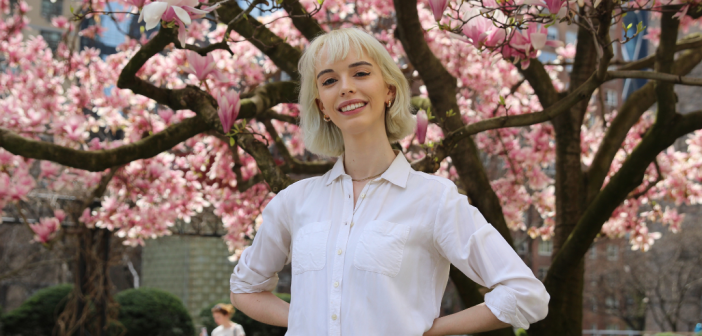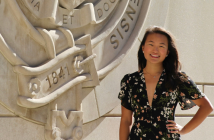 Before deciding to pursue a career in law, Carrie Plover ’24 worked as a social worker in New York City where she observed the impact of legal systems on clients with marginalized identities. She decided to become a lawyer in order “to reduce the harm inflicted on individuals by punitive systems.” Now that she has graduated, she’ll be doing just that, having accepted an offer to join the Center for Family Representation representing parents and caregivers whose children are at risk of entering the foster system.
Before deciding to pursue a career in law, Carrie Plover ’24 worked as a social worker in New York City where she observed the impact of legal systems on clients with marginalized identities. She decided to become a lawyer in order “to reduce the harm inflicted on individuals by punitive systems.” Now that she has graduated, she’ll be doing just that, having accepted an offer to join the Center for Family Representation representing parents and caregivers whose children are at risk of entering the foster system.
Plover was also recently named a 2024 Outstanding Law Student by the National Association of Women Lawyers. This prestigious award is presented annually to a student who contributes to the advancement of women in society; promotes issues and concerns of women in the legal profession; exhibits motivation, tenacity and enthusiasm; demonstrates high academic achievement; and earns the respect of the dean and faculty.
Where did you study before Fordham Law?
I grew up in Poughkeepsie, New York, and studied at Vassar College, where I double majored in international studies and French and francophone studies. I got to design the curriculum for my international studies major, and I gravitated toward classes in history and sociology, which exposed me to critical theory. My coursework helped me understand that most contemporary social problems, from gun violence to homelessness to mass incarceration, are the outgrowths of ingrained social hierarchies and cultural assumptions, not the fault of individual people. I left college eager to put these theories into practice by doing my part to challenge oppressive social structures. After a brief stint as a paralegal at a Manhattan law firm, I entered the Columbia School of Social Work’s accelerated Master of Social Work program, where I specialized in policy practice.
What are your areas of interest?
My experience as a New York City social worker heavily informs my areas of legal interest. As a social worker, I counseled adults in a community mental healthcare setting and later offered domestic violence support services to families and children living at a crisis shelter. Most of my clients were low-income people of color whose life experiences were affected by oppressive forces outside their control, like redlining, the war on drugs, and welfare reform. Those who had experienced incarceration and/or family separation were usually deeply traumatized, which made them vulnerable to mental illness, substance use disorders, and unstable relationships. I want to use my law degree to reduce the harm inflicted on individuals by punitive systems, and I intend to do so by providing legal services to individuals who could not otherwise afford a lawyer. At the same time, I want to partner with members of communities facing disproportionate rates of surveillance and policing to fight for necessary policy change.
Why did you choose Fordham Law?
When I applied to law school, I knew that I wanted to practice public interest law, which is less lucrative than private sector work. Fordham Law offered me a generous merit scholarship, which put me in a better position to pursue public service when I graduate.
I was also excited about Fordham’s Stein Scholars Program in Public Interest Law & Ethics, which offers community, mentorship, and career counseling to students who want to practice public interest law. I applied to Stein the summer before my 1L year, and I’m very glad I did. The program helped me find like-minded friends with similar career goals, in addition to supportive faculty mentors whom I’ve consulted throughout my law school career. I have also benefited from the support of Stein’s dedicated career counselors, Aisha Baruni and Angela DeVolld, who made themselves available whenever I needed help polishing my résumé, perfecting a cover letter, or preparing for an interview.
What was the best thing about studying law in New York City?
I had the ability to intern and volunteer with a number of nonprofits and legal services organizations where I got supervision from dedicated public interest attorneys whose careers I want to emulate. For instance, through Professor Leah Hill’s Family Defense and Advocacy Clinic, I spent a semester working at the Center for Family Representation (CFR), where I partnered with several attorneys and social workers who had decades of cumulative experience in family defense. When I subsequently interviewed for a post-graduate role with CFR, I had a wealth of knowledge about the organization and its work, which helped me secure a position.
What was your experience working with faculty?
I was fortunate to have worked closely with Professor Russell Pearce as a research and teaching assistant. As Professor Pearce’s research assistant, I studied several abolitionists, like Frederick Douglass and Sojourner Truth, to learn about their opinions on law as a vehicle of social progress. As Professor Pearce’s teaching assistant, I helped redesign the curriculum for the fall 2023 session of “Lawyers and Justice,” a professional responsibility class that I took the previous year. To help students reflect on how they might use their law careers to promote social justice, I helped secure a lawyer or activist to speak at every class session. For instance, our unit on community and labor organizing featured an activist from the Coalition of Immokalee Workers Collective, a worker-based human rights organization that has compelled a dozen retail food brands to comply with a human rights-based code of conduct. Ultimately, my work with Professor Pearce impressed upon me that public interest lawyers should treat people directly impacted by oppressive legal systems as equal partners with uniquely valuable insights.
What was your favorite moment at Fordham Law?
My favorite experience was working as the symposium coordinator for the Suspension Representation Project (SRP), a student group that provides representation to New York City public school students facing superintendent’s suspension hearings. As symposium coordinator, I organized SRP’s first-ever education and disability law symposium, which I put on this past February. The symposium honored the 50th anniversary of the Rehabilitation Act, the first federal law to recognize the civil rights of individuals with disabilities. I developed the overarching theme of the symposium after reflecting on what I learned in two of my favorite classes, Anti-Discrimination Law and Disability Law, taught by Professors Kimani Paul-Emile and Mary Goodwin-Oquendo, respectively. I also had firsthand experience invoking the Rehabilitation Act in legal documents I composed during my 1L summer internship at Advocates for Children, a New York City-based organization that represents students most at risk of academic failure, including students with disabilities. I’m happy to report that the event was a smashing success: we had over 200 attendees, who tuned in to hear from our impressive participants, including Assembly Member Jo Anne Simon ’90 and City Council Member Rita Joseph.
What are your career plans?
I accepted an offer to join the Center for Family Representation (CFR), which was founded to serve parents whose children were at risk of entering the foster system. At CFR, I will represent parents and caregivers summoned to family court based on allegations that they have put their children at risk. I am looking forward to defending the rights of parents ensnared in the family regulation system, which subjects single mothers, low-income families, and parents of color to disproportionate rates of family separation. I am also excited to contribute to CFR’s policy campaigns, which seek to address the root causes of family instability. Because I love working with parents, children, and families, I may one day transition to working at the intersection of education and disability law by representing parents whose children are denied the special education services to which they are entitled.
What is one piece of advice you would give to incoming 1Ls?
Before entering law school, I would advise incoming 1Ls to develop strategies to preserve their health and wellbeing. A study by the American Bar Foundation found that law students’ rate of significant mental health problems begins at an average rate but rises to as much as four times the average by graduation. I can only speculate as to the factors underlying this phenomenon, but speaking from my anecdotal experience, law students tend to feel a great deal of pressure to get the best possible grades in service of finding the best possible job. I would encourage students feeling the weight of that pressure to seek out support from their communities, avail themselves of mental health resources, and consistently carve out time for activities that have nothing to do with law school, like exercising or playing an instrument.
Did you have any important mentors during your education at Fordham?
Yes, I was highly fortunate to have had several important mentors during law school—namely, Professors Ian Weinstein, Russell Pearce, Kimani Paul-Emile, and Mary Goodwin-Oquendo. Professor Weinstein, my faculty mentor assigned by the Stein Scholars Program, consistently encouraged me to pursue my passions in lieu of activities I felt obligated to do. By taking his advice, I had a more rewarding law school experience than I would have had otherwise. I did research for both Professor Pearce and Professor Paul-Emile, two professors who are as kind as they are brilliant. I learned a great deal from assisting them with their scholarship, and I also sought them out for personal and professional advice. Last but not least, I sincerely appreciate Professor Goodwin-Oquendo’s role in making SRP’s first annual symposium a success by recommending potential panelists and acting as an excellent moderator.
Follow @fordhamlawnyc to read more student stories in our #futurefordhamlawyers series.




